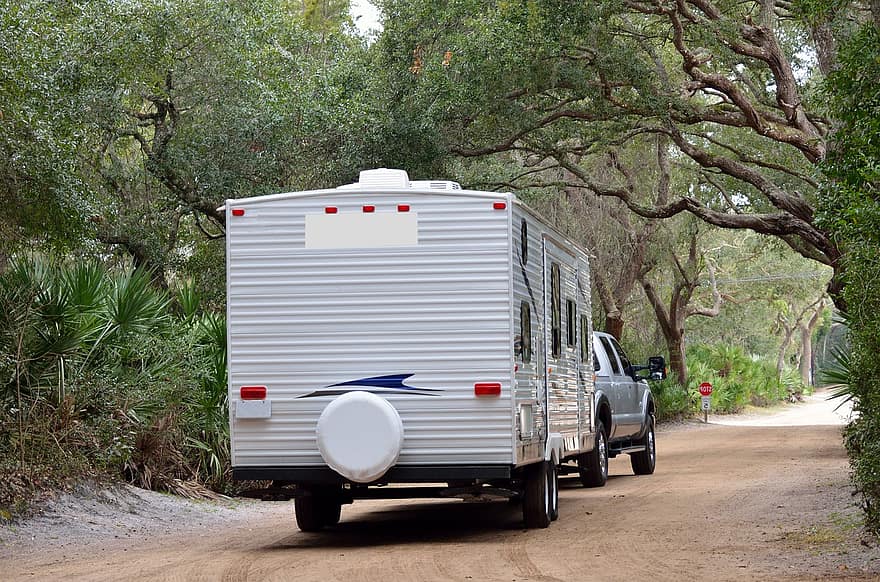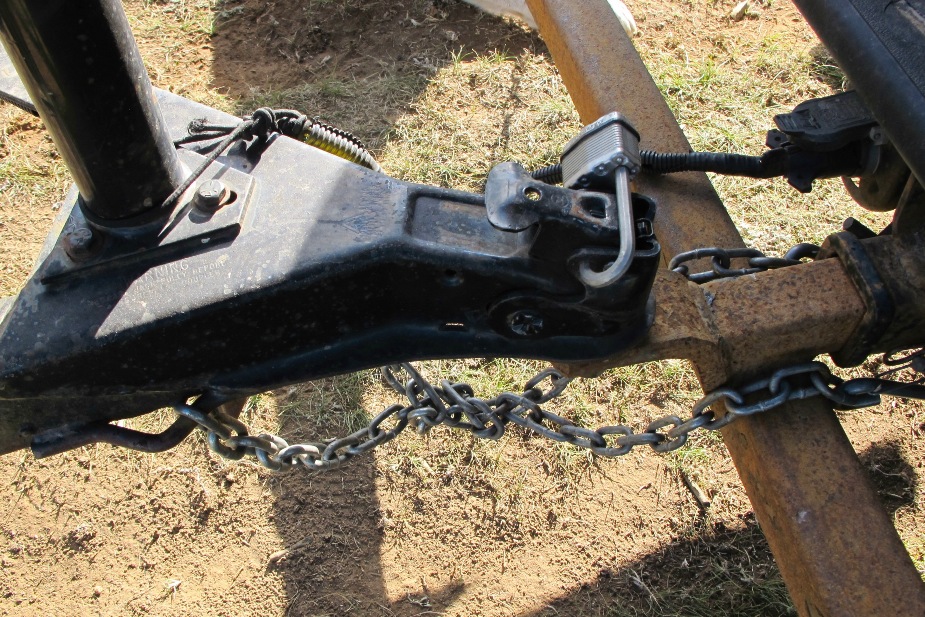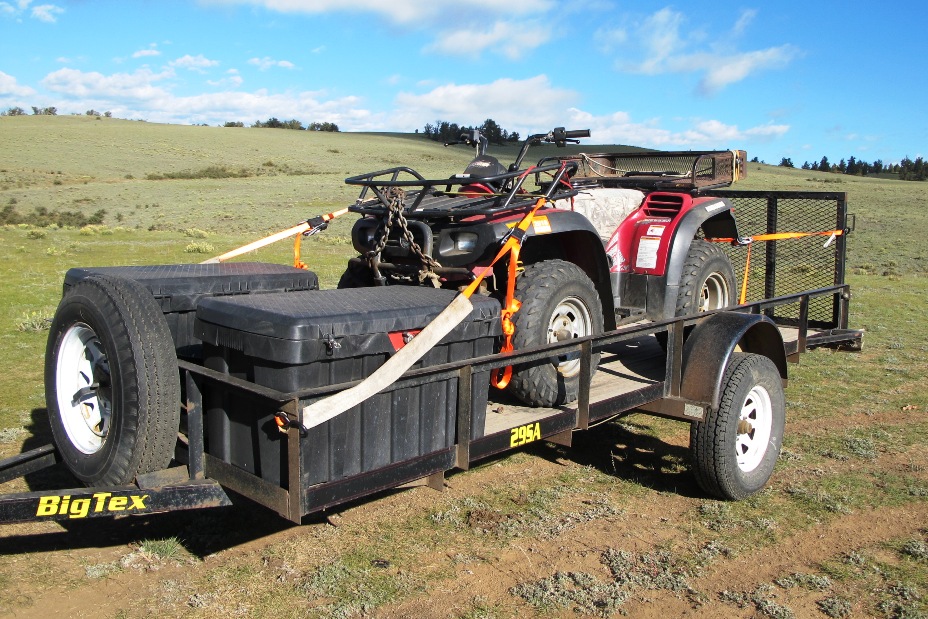
4 Trailer Safety Tips That Could Save Your Life
It doesn’t matter if your trailer is big or small, there are everyday safety steps that should be taken to avoid tragedies while on the road.
1. Stay up-to-date on regular maintenance.
Keeping your trailer in top shape is a critical step for safety. Before towing, ensure that:
-
- The bearings have been greased
- The tire pressure is correct, and the tires (including the spare) have been inspected for overall maintenance
- Wheel lug nuts should be tightened to the correct torque
- The brakes and electronic brake controller should be checked, including the emergency break-away switch
- The trailer jack and ball should be greased and functional
As well as the trailer, the vehicle doing the towing should be properly maintained since towing puts additional stress on the tow vehicle.
Be sure to keep track of all your RV maintenance with an online tool such as RV LIFE Maintenance. Not only can you keep all your maintenance records and documents in one place, you’ll receive timely reminders via email when maintenance is due and potentially avoid a costly repair or serious accident.
2. Correctly attach the trailer to the tow vehicle.
The trailer should be snugly set on the tow ball and secured with the trailer latch. The safety chains should be crisscrossed between the trailer and the tow vehicle, and connected to the ball mount with enough slack to make turns, but not to drag on the road surface.

Trailer hitch attached to the tow vehicle. (Photo by TC Wait)
The breakaway system lanyard should be connected to the tow vehicle but not to the safety chains or ball mount. Make sure all running lights, tail lights, brake lights, turn signals, and hazard lights are connected and working.
3. Make sure your weight is properly distributed.
When loading the trailer, be sure you have proper weight distribution from left to right, and front to back. A properly balanced trailer reduces the overall wear on the tow vehicle and the trailer. Do not overload your trailer beyond its maximum capacity load (or else something like this can happen).

Trailer loaded with proper weight distribution from left to right, front and back. (Photo by TC Wait)
About 60% of the load should be placed in the front half of the trailer so that the tongue weight of the trailer hitch is about 10% of the total weight.
The trailer tongue should sit about level with the tow hitch, not tilted up or downward. The load should be evenly divided between the left and right sides, and then secured so that it doesn’t shift during transport.
4. Do a 360 walk-around before you take off.
Before any driving, do a full visual inspection of the trailer and tow vehicle from all angles to be sure that everything is secure, functioning, and ready for the road.
Make sure your trailer jack and stabilizers are up and locked in place. Ensure that items in the trailer are securely fastened and that any straps are tight and the ends tucked away securely. Make sure you have your wheel chocks and jack stands. Ensure you have good visibility in your tow vehicle mirrors.
Keeping trailer safety in mind every time you tow can help prevent dangerous and costly accidents, as well as unwanted wear and tear on your rig.

Thanks for the advice to make sure all lights, including brake lights, turn signals, and hazard lights are working before taking a trailer on a trip. I was excited to purchase a used trailer online that I could use for camping this summer, but I’m pretty sure the lights aren’t working. After getting new trailer lights, I’ll be sure to check them regularly in order to ensure my trailer is safe and in working condition.
After towing four different travel trailers and fourty years of it you experience a lot of does and don’ts. I can tell you I’ve seen serious accidents which could have been prevented if only safety checks were followed. For you and yours never ever, neglect your equipment including your tow vehicle. I agree and confirm Larry Weaver recommendations.
I’ve been thinking of getting a trailer to haul stuff around in, so I appreciated the tips you gave on trailer safety. My favorite part was how you took the time to stress the importance of regular maintenance to ensure safety when towing. I’ll make sure my trailer gets inspected regularly if I get one since I want to make sure I stay safe.
I purchased a used tow dolly with electric brakes. Seller said he never used brakes. When I hooked up dolly to my motor home brakes pulsed when signal lights were on, night lights caused lockup. Harness was wire wrong. Little wonder he didn’t use brakes!!!
I had a near disaster mishap because of a cheap hitch pin that broke! Wish I’d seen this before! I now have a much sturdier pin but my hitch did come loose and the chains saved me and my teardrop camper from damage. The front toolbox had some damage but I was very lucky. Get a sturdy locking hitch pin!
I watched the video about the crash and noticed the rear steps were extended. wondering if he bumped the steps into the truck to start the swaying. Always do a final walk around and make sure everything is locked and put where it should be for traveling.
I have also been advised by state highway patrol to not leave the security lock on the hitch mechanism when on the road but to use a pin that can be removed in the case of an accident where emergency staff can remove the trailer form the tow vehicle if necessary.
Wow! Thanks for that tip. Didn’t even consider that.
From 2 of the display pictures the safety chains were twisted to shorten them, which will reduce the chains ability to work properly. Take 20 minutes a and a couple of wrenches and shorten the chains to the proper length. To show these pictures endorses this use as being acceptable. In my home province if you were to be pulled over by authorities you would be subjected to a ticket for this infraction. All of your written comments are right on . People go by what they SEE.
Why cross the chains? I do it because it was said to me in the PI, I but why?
The X that the crossed chains form is a cradle for the hitch if it comes loose, keeping the hitch off the road and allowing you to safely stop.
I had no idea that crossing the chains was for this purpose…thank you! I didn’t have them crossed when my boat trailer jumped off the ball and the chains let the hitch hit the ground but did stop the front of the boat from hitting the back of my truck. So I am going to cross them from now on!
Keep in mind that if you have electric brakes and a breakaway cable, which is designed to close a switch if the trailer becomes disconnected while going down the road, you MUST have battery power on the trailer in order for the brakes to be activated by the breakaway cable since there will no longer be any power from the towing vehicle since the cable from the towing vehicle and the trailer will be pulled free by the errant trailer.
I like how you mention to correctly attaching the trailer’s hitch to the tow vehicle for safety. My dad wants to install a hitch for our trailer. Thank you for the advice. I’ll contact a trailer hitch installation service so my dad and I can go camping.
With my trailer, I think I need to do some work on it. As you said, it would be good to make sure that the bearings are greased. I’ll probably have to get someone to do it for me as I have never done that before.
Thanks for explaining that it’s a good idea to do a full visual inspection of the trailer before we start driving to make sure everything’s secure. My husband wants to buy a poly pipe trailer online to use at his work, and I want to make sure he stays safe while towing it. I’m glad I read your article because passing along your tips will give me peace of mind that he’ll use the trailer safely.
On item # 2. I have been taught to not use a locking pin or padlock to secure the ball hitch latch as if one or the other of the vehicles catch fire, It’s far easier to disconnect a safety spring pin than it is a keyed lock when you are in the panic mode.
My grandpa is needing to use his trailer to help one of his friends move next week, but part of his trailer broke the last time he used it. It’s nice to read that you should make sure bearings are greased, the tire pressure is good, and the jack and ball are functioning properly. Once he finds a trailer repair service in Perth, I will recommend he does these things to maintain it.
Just finished a 4500 mile trip incident free by doing the walk around and gauging all tires with a known good tire gauge. Carry a rag and wipe the lights off when you go by. These walk arounds were Federally mandated for me for 40 years and just carried it over to the RV.
I too have been driving RVs and pulling trailers for many years and have been observing actions that appear to be happening more and more as the years go by. I am not sure what the cause is but have noticed that the larger the trailer is the faster drivers think they have to drive. It would be interesting so know just how far it would take some of the trailers and RVs that I see going down at 80 miles/hour plus. As for me I enjoy driving and refuse to get in that habit. I also hope and pray that I never get in the way of some of the rigs I see going down the road realizing that it would take a great distance to get some of those rigs stopped in case of an emergency.